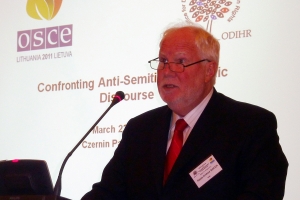OSCE Meeting Confronts Anti-Semitism in Public Discourse

23 March 2011 – Prague
Participants at an OSCE meeting in Prague on confronting anti-Semitism in public discourse today called for more decisive steps to counter expressions of intolerance and hatred while preserving the freedom of speech.
At the opening of the two-day meeting organized by the OSCE’s Lithuanian Chairmanship and the OSCE Office for Democratic Institutions and Human Rights (ODIHR), speakers voiced concern over persisting expressions of anti-Semitism in many OSCE participating States and stressed the risks this entails for the security of individuals, groups and societies.
“Current anti-Semitism may appear as old poison in new bottles, but the content is as deadly as ever before. In line with the general rise of hatred and hostility in European societies, anti-Semitism is very much alive in the 21st century – in countries formerly under the communist rule as well as in Western Europe,” said Jiři Schneider, the First Deputy Minister at the Ministry of Foreign Affairs of the Czech Republic, which hosts the meeting.
Ambassador Janez Lenarčič, the Director of ODIHR, stressed the challenge of finding the right balance between freedom of expression and the right to be protected from harm that can result from intolerant speech.
“My sense is that we are currently at a crossroads where long accepted principles and beliefs are being questioned in many democratic societies. From a security standpoint, this is particularly worrying since history shows that this is precisely when minorities are at risk of scapegoating by the majority because of their being different,” he added.
Rabbi Andrew Baker, Personal Representative of the OSCE Chairperson-in-Office on Combating Anti-Semitism, said that even when political leadership was principled and recognized anti-Semitic discourse as unacceptable, serious action was frequently lacking: “Shaky coalitions and minority governments limit the ability or willingness to act. These days we are probably fortunate if mainstream parties can be restrained simply from getting down in the mud, and even that is not always the case.”
He added that the media plays a significant role in this context as a messenger, but also as an actor or enabler of anti-Semitic discourse.
Asta Skaisgirytė Liauškienė, the Vice-Minister of Foreign Affairs of Lithuania and representative of the OSCE Chairperson-in-Office, stressed the destructive quality of anti-Semitic images and stereotypes and said more must be done to stop these being passed on to future generations: “We are called upon to find new ways to teach, at an early age, the story of the Holocaust and inoculate our children from the virus of anti-Semitism.”
The need for better data on expressions of hate, stronger government leadership in confronting hate speech, and more investment in tolerance education were among the proposals made by the opening speakers.
Tomorrow’s panel discussions will focus on traditional anti-Semitic themes and stereotypes, international developments as a new factor related to manifestations of anti-Semitism, and practices that have proved to be effective in confronting anti-Semitic discourse.